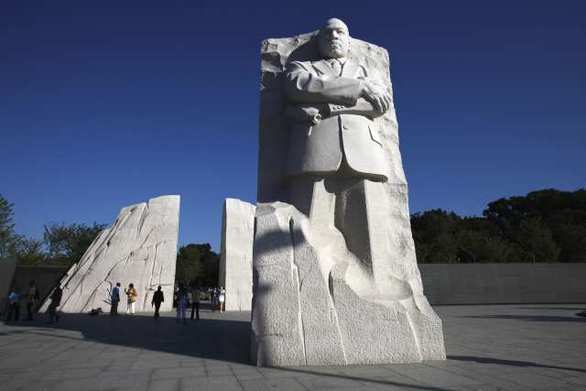 |
| The Martin Luther King, Jr. memorial towers over those who visit, giving the impression of a larger-than-life man of mythic proportions, a standard trope in national figure memorialization. |
Historians know that memorials can take on a life of their own. Those who have lost a loved one know that memory can be distorted after the fact - deceased loved ones take on a grandeur as memory becomes hazy and good times are more often remembered than bad in the face of terrible loss. National commemoration can be similar. Often, the memory surrounding figures of national importance becomes larger than life after their death, both literally and figuratively. This can result in mythology and inaccuracy, sometimes inadvertently and sometimes as a result of political manipulation.
Critics of the popular historical memory of Martin Luther King, Jr. already accuse the mainstream establishment of whitewashing King's legacy, ignoring the militancy of his later years and his sharp critique of the political machine, especially in regards to the Vietnam War. Many important Black intellectuals, including Dr. Cornel West and others, have spoken of this trend. While I was still at CBU, I attended a lecture by Angela Davis, former Black Panther and social justice advocate. As she broached this issue, she encountered vast approval from the audience of academics, community members, and students. This is not a fringe belief. That same year, the Memphis College of Art hosted an exhibition of art inspired by the more radical, less depicted beliefs of King.
Therefore, the controversy surrounding the Martin Luther King, Jr. memorial is a crucial one. It's important to examine the popular memory of King and to search for inaccuracies in the way he is depicted. How can we present a full picture of the life and legacy of such an important figure in 20th century American history? How can we do justice to the man, to the movement, and to the people who were inspired by him? We can start by ensuring that his comments are put in their proper context, especially on his public memorial.
The controversy surrounds the sentence, "I was a drum major for justice, peace and righteousness," a paraphrase of a larger sentiment from "The Drum Major Instinct," Dr. King's final sermon. As a former writing tutor and teaching assistant, I know well the slippery slope associated with paraphrasing and with taking a quote out of its context. As it turns out, the speech promotes the opposite of what this quote suggests. King spends the speech arguing against what he calls the drum major instinct, the tendency towards showboating and co-opting a movement. This is especially important because this is a charge sometimes leveled against Dr. King - that his larger-than-life figure actually was so prominent in the Civil Rights Movement that, after his death, it was perhaps inevitable that his memory become co-opted, that his legacy would become skewed, and that the movement would lose momentum.
Shouldn't his monument include a more inspiring quote? A quote that the man might say himself? One that reminds every person who visits to become a better person, to work towards the goal Dr. King envisioned? Because that goal is still not achieved. King's dream has not come fully to fruition. Perhaps it never will. Perhaps the true grace is in the struggle, the never-ending march towards justice and equality for all. King's monument should inspire that struggle in those who view it, not a sense of complacency in a job well done or a sense of awe for a man who, if his last speech is to be taken at face value, never wanted such regard for himself to be his true legacy.
Read the original speech, in its entirety, here.
No comments:
Post a Comment